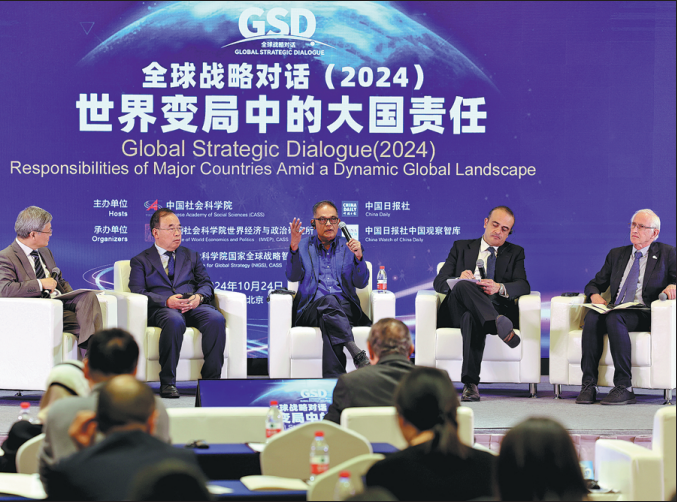Scholars call for inclusive growth


As the world is confronted with a myriad of risks and challenges, scholars from home and abroad called for joint efforts from various countries to promote inclusive and mutually beneficial sustainable development.
Amitav Acharya, a distinguished professor of international relations with the School of International Service at American University, stressed the significance of what he called the emerging world order, a Global Multiplex.
He said the Global Multiplex will be a more inclusive order where civilizations, ideas and the rules of all countries will be taken into account. The West should get over the "very arrogant and racist" idea that "the West is superior and the rest are basically following them," he added.
He called on the West to heed the voices of the vast majority of countries in the Global South that are yearning for peace and declining to pick a side in international affairs.
Domenico Lombardi, professor and director of the Policy Observatory at Luiss University in Italy, urged countries to maintain dialogue and build trust to avoid strategic competition "undermining the very fabric of international cooperation that supports the world's economic architecture."
He described the European Union, the United States and China as the world's three major economic powerhouses, saying in recent years they have seen fluctuations and have even witnessed "escalating tensions" in their economic interactions, especially in areas of technological innovation and national security.
"The concept of economic decoupling, particularly between the US and China, presents a significant risk that could reverberate through all sectors of the global economy. Such a shift could lead to inefficiencies and increased costs, impacting global growth negatively that no one can simply afford."
He stressed the importance of pursuing a "win-win" attitude based on reciprocity while calling on countries to keep engaging in open and cooperative interactions.
"Our interconnectedness, while occasionally a source of friction, is also our greatest strength, offering resilience against economic shocks and fostering shared progress that individual country efforts cannot match," he added.
Zhao Jinping, former director of the department of foreign economic relations of the development research center of the State Council, said countries should reach a common understanding on the harm of protectionist measures and create an inclusive environment for the global economy.
He expressed concerns over trade protectionist measures that are likely to be introduced by some countries against the backdrop of slow world economic recovery, saying they will "create troubles for enterprises and stifle global trade and investment growth."
Robert Walker, a professor at Jingshi Academy of Beijing Normal University, said wealthy countries should accept and facilitate the right to development, and work with others to revitalize global partnerships for sustainable growth.
He quoted Secretary-General of the United Nations Antonio Guterres as saying that "systemic deficiencies and inequities in the global economic and financial system leave developing countries to tackle enormous and growing challenges with only a fraction of the international support they need and deserve."
Walker cautioned that today, among 17 Sustainable Development Goals adopted by the United Nations in 2015, there is only one goal, ending extreme poverty, where across-the-board progress has been made.
According to Walker, China succeeded in eliminating rural extreme poverty in 2020, accounting for 20 percent of the global reduction in poverty achieved between 2015 and 2022.
He hailed China for seeking to "make real the right to development" through ventures such as the Belt and Road Initiative, the Global Development Initiative, the Silk Road Fund and the Asian Infrastructure Investment Bank, creating shared prosperity for all.

































